


Ethnic minorities make up almost 1/7 of the population of Georgia (except for the population of the occupied regions). Among them, the most numerous are Azerbaijani (6.3%) and Armenian (4.5%) communities. Due to the language barrier and other factors, the integration of larger ethnic groups into civil society is quite weak.
Concerning the integration of representatives of ethnic minorities, the media has an important function. It plays a major role in the formation of public opinion and can be a connecting link between the minority and the majority. However, the information vacuum created due to the language barrier is a big challenge for representatives of ethnic minorities. A large number of Armenians living in Georgia receive their information through Russian and Armenian-language media, while Azerbaijani and Turkish media remain an important source of information for the Azerbaijani-speaking population, with Russian a relatively less important source. It should also be noted that the role of local (Azerbaijani and Armenian language) news portals has increased in recent years in the Azerbaijani and Armenian communities, although additional steps need to be taken to fill the information vacuum. According to the research conducted by the "Institute of Social Research and Analysis" in 2021, Azerbaijani (53.4%) and Turkish (40.5%) media outlets were trusted among Azerbaijani-speaking respondents, and Armenian media outlets were trusted by Armenian-speaking citizens (57.8%).
A serious challenge facing ethnic minorities living in Georgia is Russian disinformation, the purpose of which is to spread anti-Western sentiments and pro-Russian narratives in society. These have a great impact on the views of ethnic minorities in particular regarding the current events in the region and the world and contribute to the formation of "different" public opinion in the community, including about the European and Euro-Atlantic integration of Georgia. According to the latest survey by NDI, 79% of the population of Georgia supports the country's accession to the European Union, and 67% - to NATO. According to the data, the support for the European and Euro-Atlantic integration of Georgia is the lowest in the municipalities inhabited by ethnic minorities. According to the national indicator, 66% of the population of Georgia believes that the country will get more benefits from European and Euro-Atlantic integration. Only 20% of ethnic minorities agree with this sentiment. 28% believe that Georgia will benefit more from establishing good relations with Russia. It turns out that a large number of ethnic minorities (41%) cannot choose between these two radically different views, and claim that they do not know which would be of greater benefit to the country (NDI, 2023).
Given all of the above, IDFI became interested in how the Azerbaijani and Armenian media covered the events of April-May surrounding the Russian-style Foreign Agents Law in Georgia. The current political situation in Georgia is directly related to Azerbaijan and Armenia. Georgia's distancing from Europe and its shift to the Russian orbit, which many politicians fear not only in Georgia, but also in Europe,[1] is especially noteworthy for Armenia. Recently, in the neighboring country, there has been an active conversation about the need to get closer to the European Union, and four parliamentary parties even demanded a referendum on this issue. The topic is also important for Azerbaijan, with Georgia being one of its important transit and trade partners. Georgia's role is important considering the current situation between Azerbaijan-Armenia and Armenia-Turkey and, in general, in the multilateral relations of the region.
IDFI, with the help of partner Azerbaijani- and Armenian-speaking researchers, studied the coverage of the events surrounding the Russian-style Foreign Agents Law in the media of both countries.
The observation of the coverage of the ongoing processes in Georgia around the "Russian-style law on foreign agents" by Azerbaijani televisions and leading news agencies shows that some televisions and media outlets covered the current events in a negative context, while others took a more neutral tone.
During April-May, Azerbaijani televisions and news agencies intensively provided information to viewers/readers about the current events in Tbilisi. Two television stations—Azerbaijan State Television (AzTv) and Public Broadcaster (İTV - İctimai)—as well as agencies: Azertac.az, Report.az, APA.az, Azadlıq Radiosu (Radio Liberty), Meydan.Tv were selected for observation.
During the period of April-May, Azerbaijan State Television (AzTv), State News Agency (Azertac.az), Report.az, and APA.az news agencies actively covered the current events in Georgia: protests, statements made by government officials and the President. Of note was the content of about 20 articles published by the above-mentioned news agencies and the opinions of various experts (as well as the stories prepared by Az.Tv), where the main focus was discrediting Georgian non-governmental organizations and the West.
One mainly encountered the following narratives:
- The government of Georgia wants to pursue a balanced policy, and the West does not allow it to do so;
- There is a political conflict between the West and Russia for Georgia;
- The West is attempting to interfere in Georgia's internal political affairs and threatens it with sanctions;
- The West is going to overthrow the government in Georgia;
- The West provides financial support to non-governmental organizations and certain political parties in Georgia;
- Non-governmental organizations not only interfere in political processes but also undermine the "pillars" of Georgian society as a whole;
- Many Western countries, including the US, have stricter laws on transparency;
- The European Union is also trying to adopt a similar law;
- The law adopted by the Georgian authorities is similar to Western laws;
- The current events are a continuation of the Ukraine scenario and aim to turn Georgia into the next arena of geopolitical conflict;
- The goal of the steps taken by the government of Georgia, like Azerbaijan, is to protect the country's sovereignty.
The articles of the state news agency AZERTAC are distinguished by message boxes containing an anti-Western narrative, specifically emphasizing the interests of the West about the ongoing processes in Georgia in terms of weakening Russia's political influence. In one interview, the respondent—political commentator Rustam Taghizade—notes that while the Russia-Ukraine war continues, the West wants to strengthen its positions in the South Caucasus. He also emphasizes that civil society and non-governmental organizations in Georgia want to disrupt the government's plan through a fierce fight. Western countries are not satisfied with the current government of Georgia. After the start of the Russia-Ukraine war, the mechanism of their influence on the countries of the South Caucasus was strengthened. The struggle for Georgia between the West and Russia will become more serious because the political elite of the West is going to change the government in Georgia.
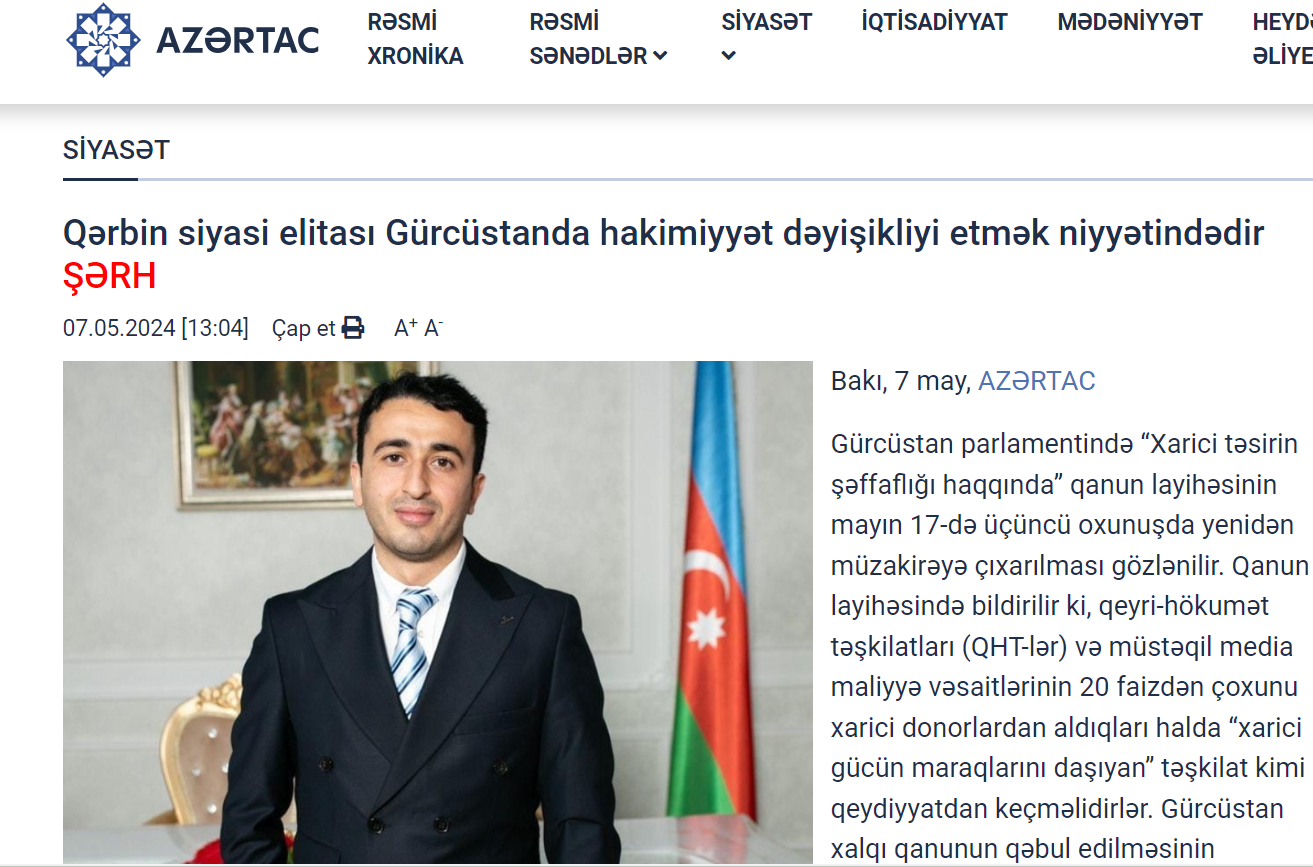
In several articles, AZERTAC focuses on specific Western foundations, such as the Open Society Foundations, the National Institute for Democracy, the US National Endowment for Democracy, and the International Republican Institute, in a context that they supposedly participate in the process of forming networks of agents of influence in the United States and other Western countries, with recent events serving to turn Georgia into the next arena of geopolitical conflict.
Of note is AZERTAC's interview with Sahib Mamedov, which, repeats the Russian propaganda and official narrative of the Georgian government. Mamedov discussed with AZERTAC the law "On Transparency of Foreign Influence" and noted that a similar law exists in many countries and is in the strictest form in the United States of America. He noted that some states are retreating in the face of internal and external pressures and giving a lot of space to the activities of foreign donors. As a result, in some cases, the country's state institutions are weakened, the legal system is changed, and many non-profit organizations, media organizations, and even parties are created that serve different interests. Mammadov notes that, in recent times, among the methods of influence used by some superpowers, there appears to be a policy of "smart power" or "intellectual influence", which includes, but is not limited to, elements of both force and soft influence. He believes that the policies of "soft influence" donors and "strong influence" donors are quite different. As an example, he cites USAID, which he believes widely uses "soft influence" instruments of legitimate activity. USAID and similar organizations, in close cooperation with the governments of the countries and non-profit organizations, close to the governments, gradually achieve changes in the country's legislation following their interests and create civil society networks in the regions. One of the organizations that Mammadov also discusses is the US foundation NED (The National Endowment for Democracy). He repeats the narrative of Georgian government officials. He believes that NED is one of the donors with a "strong influence" and a radical position and is used as a means of pressure on the government, secretly or openly financing non-governmental organizations, media organizations, and individual activists who operate in this or that country. He also notes that, currently, Armenia is a convenient platform for pursuing the interests of the United States and some Western countries - "The government, civil society, political party, and church of this country are completely dependent on various external forces. From this point of view, internal stability in the country is constantly being violated. The Armenian government cannot make independent decisions. Peace processes are also delayed for this reason".
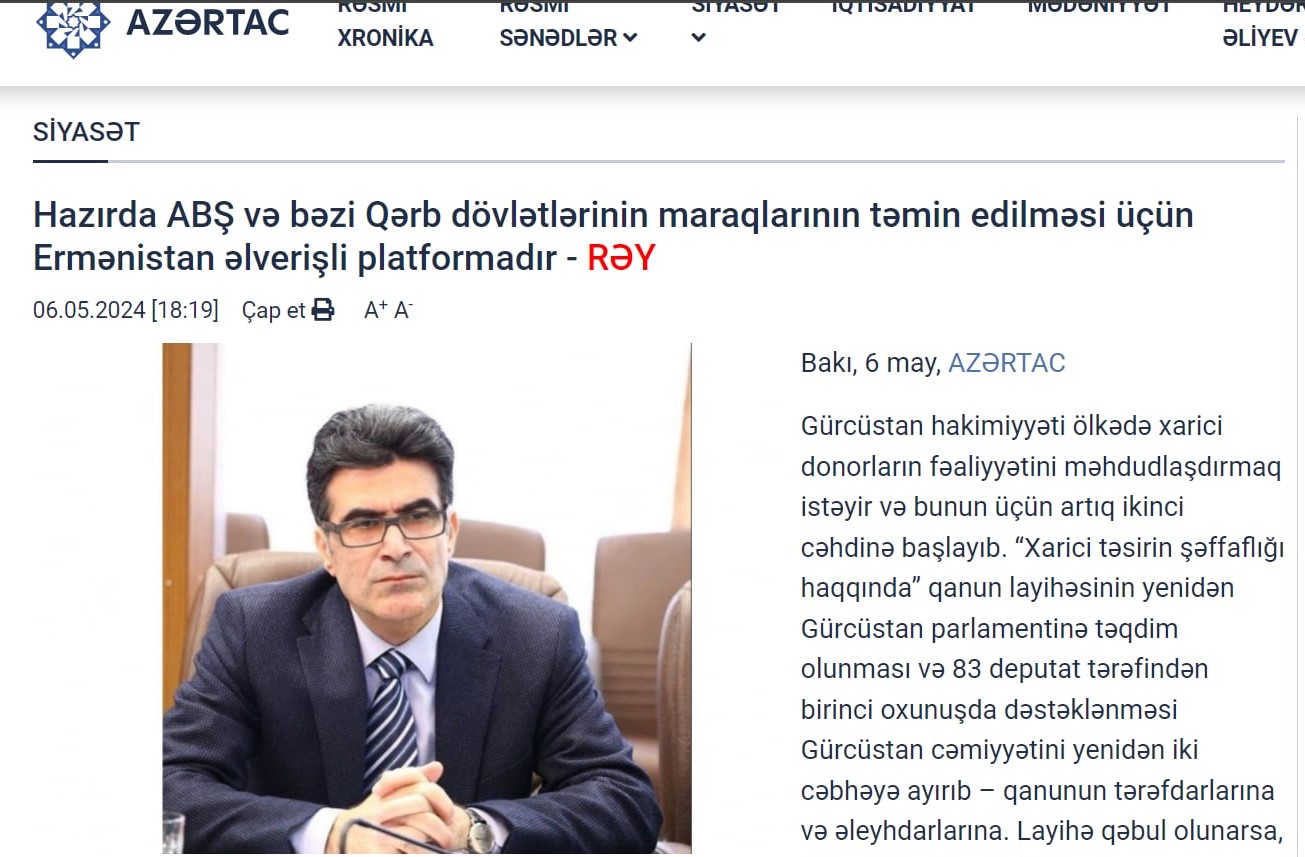
According to one article published by AZERTAC, political scientist Yegane Hajieva pointed out that Georgia has spent more than 20 years on its way to joining the European Union, while in response, the European Union raises abstract issues such as "priority issues to be resolved" as obstacles. Hajieva states that drugs, pedophilia, and LGBT propaganda are "European values" established in Georgia. According to her, Georgia leads in the statistics of drug use in the South Caucasus, with young people especially using them. She also draws attention to the decision of the Constitutional Court of Georgia regarding the legalization of marijuana use in 2021 and states that its initiators - "Girchi" and "Georgian Young Lawyers’ Association" today "fight tirelessly" against the "Law on Transparency". According to her, the European Union also demands freedom of LGBT propaganda from Georgia. "Georgia is a country in the South Caucasus where LGBT propaganda is carried out freely, even among minors," the author says.
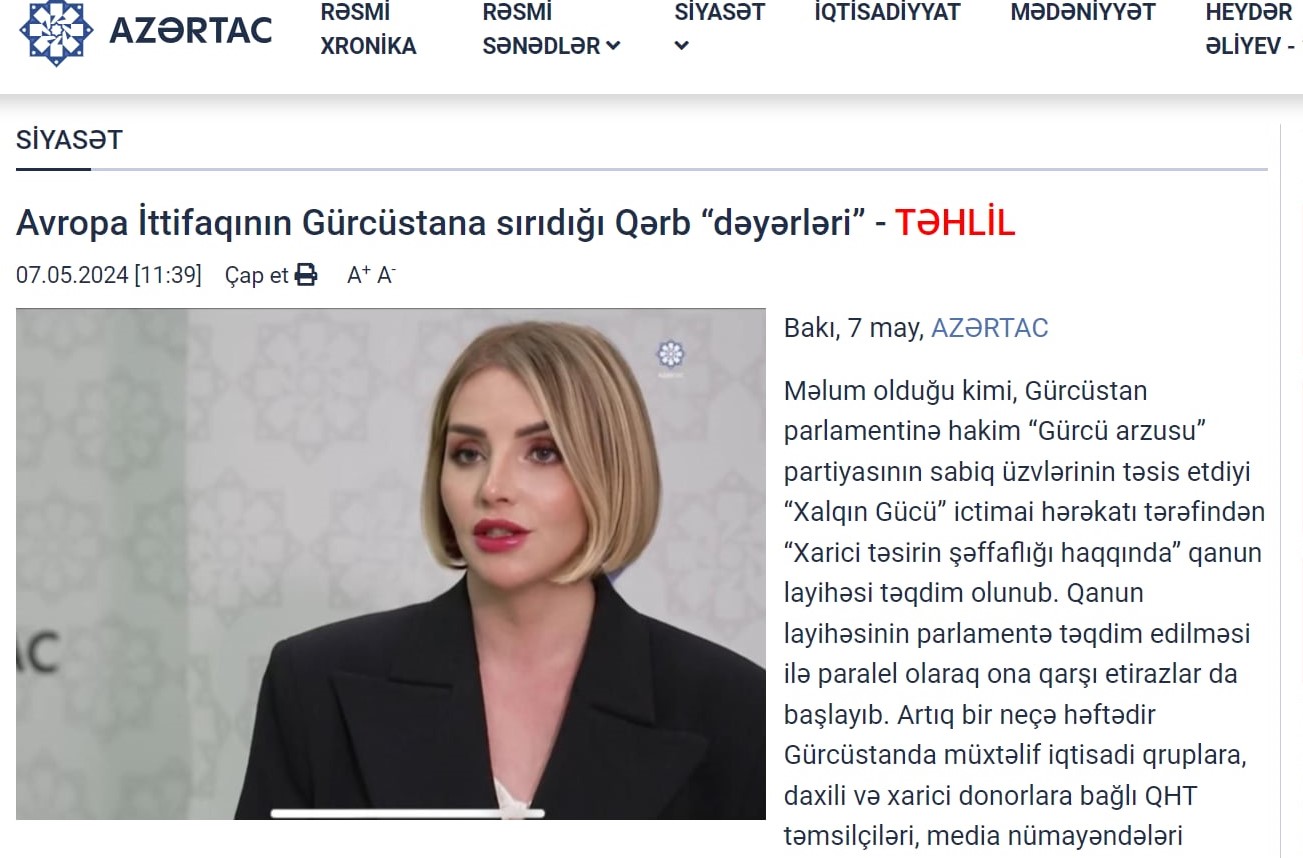
Azerbaijan's state television (AzTv) tried to maintain a neutral position, although some of the headlines of its material were biased and reactionary: "The West, Having Been Kicked out of Caucasus, Takes Revenge - Hidden Game around Georgia."
The opinions of Georgian political scientists, experts, and former politicians, Amiran Salukvadze, Davit Aptsiauri, Vaso Kapanadze, Levan Mamaladze, and others were also spread through Azerbaijani media. They always talked about the law in a positive context and claimed that Georgia needs the law to protect its sovereignty.
Levan Mamaladze, convicted by Saakashvili's government, amnestied by Ivanishvili's government, and a high-ranking official from the time of Shevardnadze's government, the former governor of Kvemo Kartli, is well-known to the public. Recently, he became politically active and, for example, said that Georgia's defeat in the August 2008 war was "a part of the commercial project" of the regime at the time. On his social network page, he stands out with statements in support of Russian-style Foreign Agents Law.
"The West and the USA do not want to see a strong Georgia" was the title under which the interview with Levan Mamaladze was published by Azerbaijani news agency Report.az. According to Mamaladze, media outlets are trying to create a narrative "as if Georgia is moving away from Europe". Young people, who make up the majority of the protestors, are supposedly not sufficiently informed about what is happening. " We will not allow them to play with the fate of our people this time. The government's decisions and positions are very strict. They say that they will go to the end on this issue. We know that we are the country that connects East and West. Therefore, big countries have their interests here. But the interesting thing is that there is also a Russian factor in the region. If Russia sees the scenario of a Western coup in Georgia, no one and nothing can stop them. They will take the tanks directly to Tbilisi. That is, this concerns the issue of Georgia's independence. Therefore, the government cannot risk the fate of the people," Mamaladze said.
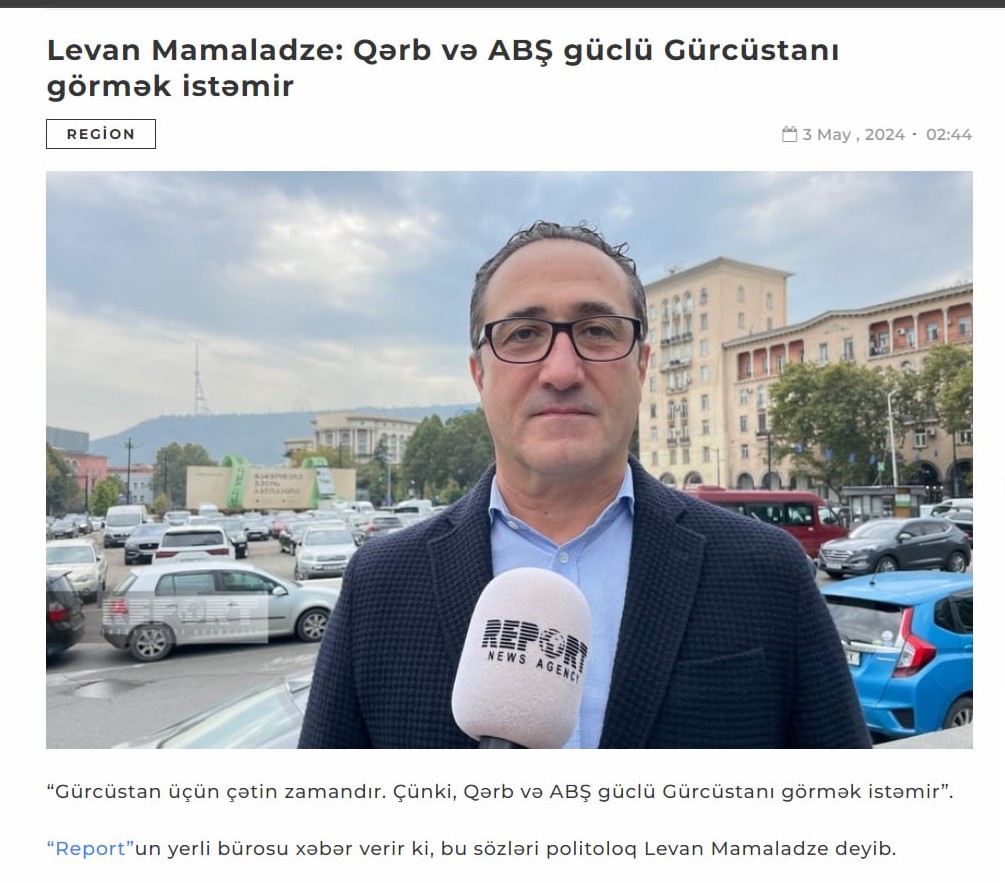
Vaso Kapanadze observed the fraudulent March 2024 elections of the President of Russia as a representative of the analytical center "Expert Plus". He is a journalist by profession and has participated in meetings between Russian and Georgian experts in different formats for years. He participates in Levan Vasadze's programs, etc.
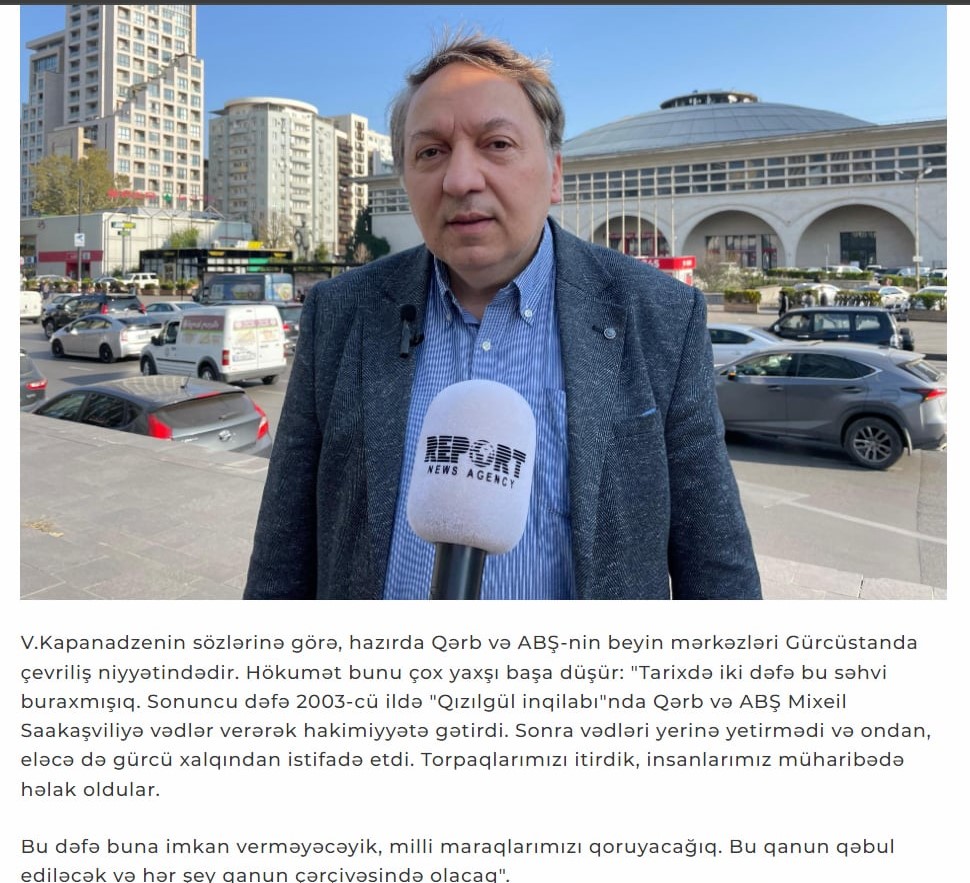
Amiran Salukvadze is a pro-government military expert, often participating in "Imedi" TV programs and speaking against the opposition and critical media.
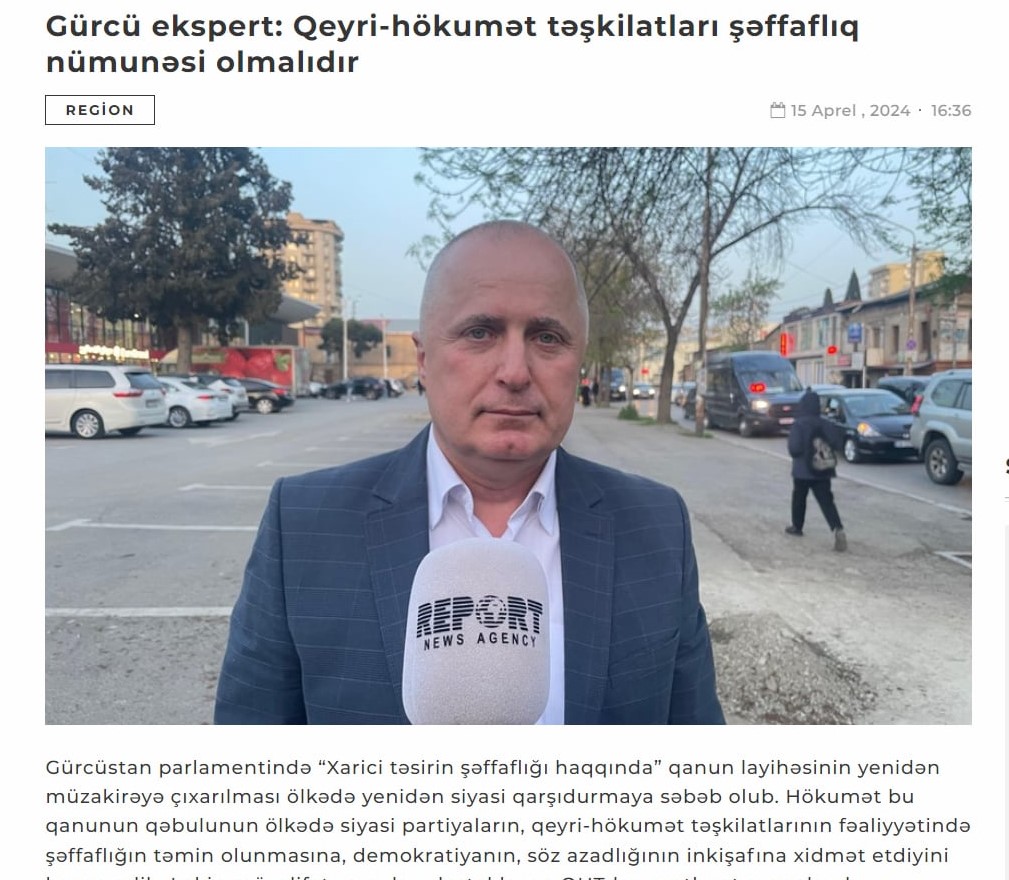
The news agency report.az is particularly critical of the West, considering the adoption of the law "On Transparency of Foreign Influence" reasonable. In most of its articles, it stands out with its assertive manner when discussing the deliberate actions of the West. report.az notes that "Georgia's opposition to the adoption of a law similar to the Western law caused a conflict between the parties. The question then becomes, why did the US, EU, etc. pass "Laws on Foreign Agents"?" In one article titled - "The West is trying to play in Georgia: the tension between the political elite is growing" - the author expresses a belief that the West itself adopts normative-legal acts on foreign influence, bans foreign financing, but tries to ban such legislation in other countries. This is purportedly the most obvious example of double standards. The article suggests that the US and the European Union are doing this on purpose - deliberately pitting the government against the people. One of the goals is the possibility of Western intervention in the South Caucasus. The article states that what the West has done in the region shows that Washington and especially Paris are ready to do a lot to strengthen their "leverage" in the region. The author notes that "the main goal of Georgia is to protect sovereignty and national security. Adoption of the law is intended for this. But the West interprets the process as it wants".
The connection between the current events in Georgia and Armenia was discussed in a negative context in some of the articles published on the news agency apa.az. According to the articles, the West is simultaneously looking for new platforms to strengthen its influence in Georgia and Armenia, condemning the crackdown on demonstrations by the police in Georgia while not voicing disapproval regarding the crackdown on anti-government demonstrations in the case of Armenia. The media outlet describes the rally of the ruling party "Georgian Dream" on April 29 with a positive background, openly refers to the open letter of 14 US senators to the Prime Minister of Georgia, Irakli Kobakhidze, as a threat, and quotes numerous statements of the ruling party, including the statement that "joining the European Union and integration in the West will be carried out in parallel with the protection of national identity and values, but the non-governmental sector is trying to destroy them".
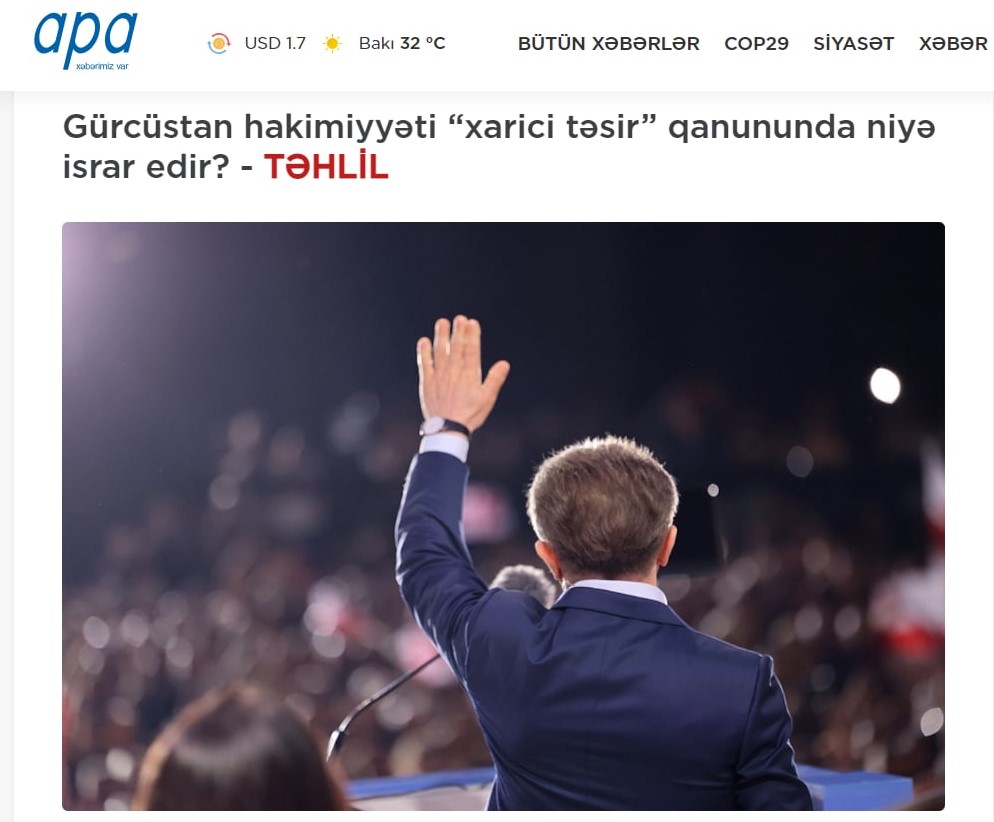
The news agency APA discusses in one of its articles the policy of the European Union about the candidate countries and explains how the geopolitical situation affects their vision and decisions. For example, it emphasizes the period after the start of the Russia-Ukraine war, when the EU accelerated the accession procedure for Ukraine, Moldova, and Georgia. The author of the article accuses the European Union of double standards and discriminatory approaches, discussing the example of Georgia as an illustration and noting that European institutions, the European Union, and the United States do not want to listen to the arguments and positions of the legally elected authorities of Georgia regarding the adoption of the law. “On the contrary, by rudely interfering in the internal affairs of the country, they support the protest, which is against the law, is limited to a few thousand people, and aggravates the process.” It cites the appearance of the foreign ministers of Latvia, Estonia, Lithuania, and Iceland at the mass protest held in Tbilisi on May 15, and the visit of the members of the Lithuanian and German MPs to the Georgian parliament as evidence of gross interference in Georgia's domestic affairs. APA describes with special criticism the actions of the West, referring to them as a violation of all rules of diplomatic courtesy and instances of political, economic, and diplomatic pressure on Georgia. At the same time, it notes that "all this once again shows that the European Union uses the conditions for accession to manipulate and influence the other party".
The news agency APA also tried to some extent to present the coverage of the issue as objective, which was illustrated by publishing an article based on the analysis of political scientists about the protests held against the Russian-style Foreign Agents Law. The article discussed the reasons for the initiation of the Russian-style Foreign Agents Law and the possible retaliatory steps of the European Union.
Regarding the current events in Georgia, mostly neutral coverage was disseminated by the public broadcaster - İTV. Most of the stories covered the positions of both the government and opponents of the law.
As for critical Azerbaijani media (Azadlıq Radiosu / Radio Freedom, Meydan TV), these intensively covered[2] the ongoing processes in Georgia - unlike the pro-government media outlets, the emphasis was on the expected threats of the law, the consequences of a similar law adopted in Russia, attacks on activists and politicians, phone calls made to them. In some articles, the authors also emphasize that the steps taken by the Georgian government are aimed at establishing authoritarianism in the country.
The recent events related to the Russian-style Foreign Agents Law in Georgia have and will have a significant impact on the countries of the South Caucasus. This impact was especially evident in Armenia, the changed political course of which is now aimed at Europe. A few years ago, the situation was radically different, due to age-old conflicts with neighboring Azerbaijan and the belief that they were protected from losing land by Russia, which was considered a strategic partner of Armenia. However, after the de facto blockade of Nagorno-Karabakh by Azerbaijan in 2023, relations between Armenia and Russia became strained, because according to the CSTO (Collective Security Treaty Organization) procedures, its member states should have helped Armenia in this situation, but Armenia received no such assistance from Russia.
Therefore, the question of how the process of Georgia's integration into the European Union would develop became more relevant and important for Armenia, because if Georgia joins the European Union, this process will be much easier for Armenia. For the first time, the government of Armenia openly stated the position that it also wanted to join the European Union and would go through all the necessary procedures to achieve this goal. Based on this position, the actions of April-May 2024 against the Russian-style Foreign Agents Law were discussed more or less positively in the Armenian media, which we will discuss in more detail by examining the mood/positions of several popular media outlets as well as political parties in Armenia. However, it should also be noted that at the same time, protests were taking place in Armenia, and therefore, unlike other periods, less time was devoted to the discussion of the topic of Georgia in the Armenian media.
In the Armenian media space, the abundance and influence of the media outlets supporting the previous, pro-Russian government of Armenia is directly proportional to the anti-Western narratives they spread and the stereotypes that are established in Armenian society concerning the European Union and the USA. For example: "What is happening in Ukraine today is done by the hands of America, the same thing will happen in Georgia", "The people in the European Union want same-sex marriage to become possible in the Caucasus", "Why is this law Russian, when they have adopted it in America and Europe?", etc.
5TV ARM / 5-րդ ալիք is one of the media outlets that actively covered the protests of April-May against the Russian-style Foreign Agents Law in Georgia. The media outlet published a video on the social network Facebook with the title - "Brutal clashes in Georgia. The President and the West support the opposition'', which did not reflect what the current protests in Georgia were aimed at and what purpose they served. The main focus in the video was on the opposition parties, who were portrayed as the instigators of the "brutal clashes".
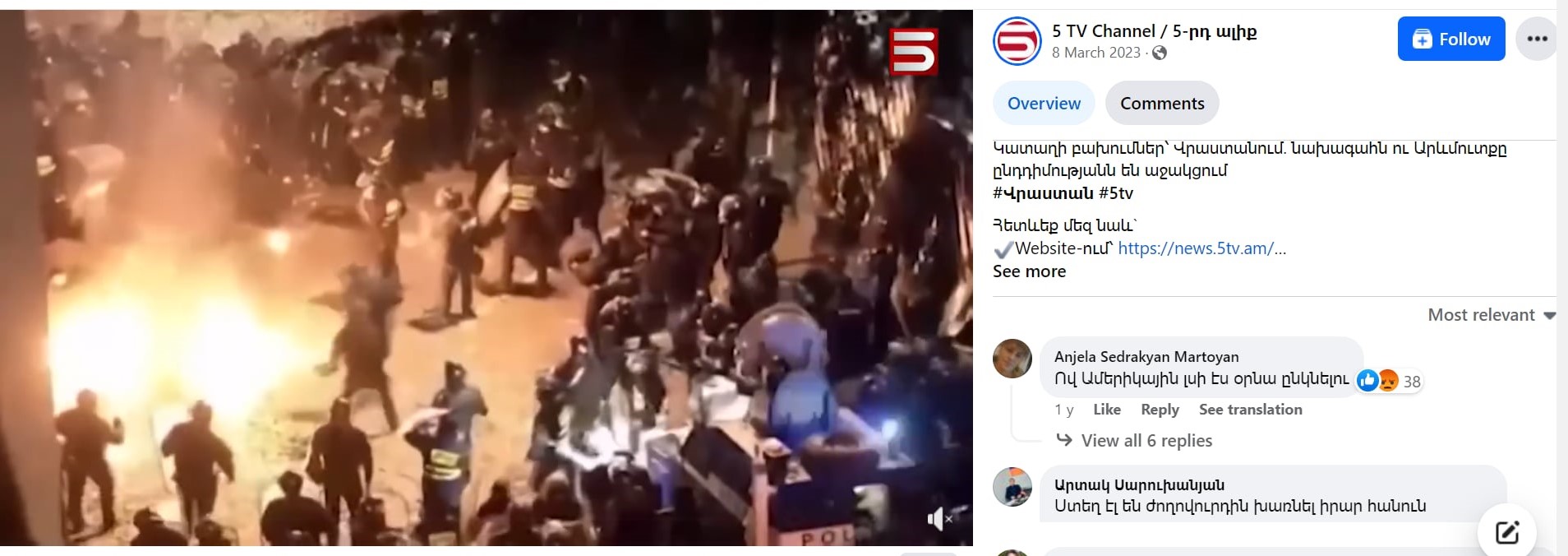
Tert.am is another media outlet supporting the previous, pro-Russian government of Armenia, although it did not cover the current events in Georgia. Only a few articles were written about the different opinions and attitudes of the ruling party and the President of Georgia regarding the law. Attention was drawn to how Irakli Kobakhidze called Salome Zurabishvili an agent, followed by an explanation of why members of the ruling party considered Zurabishvili a "foreign agent".
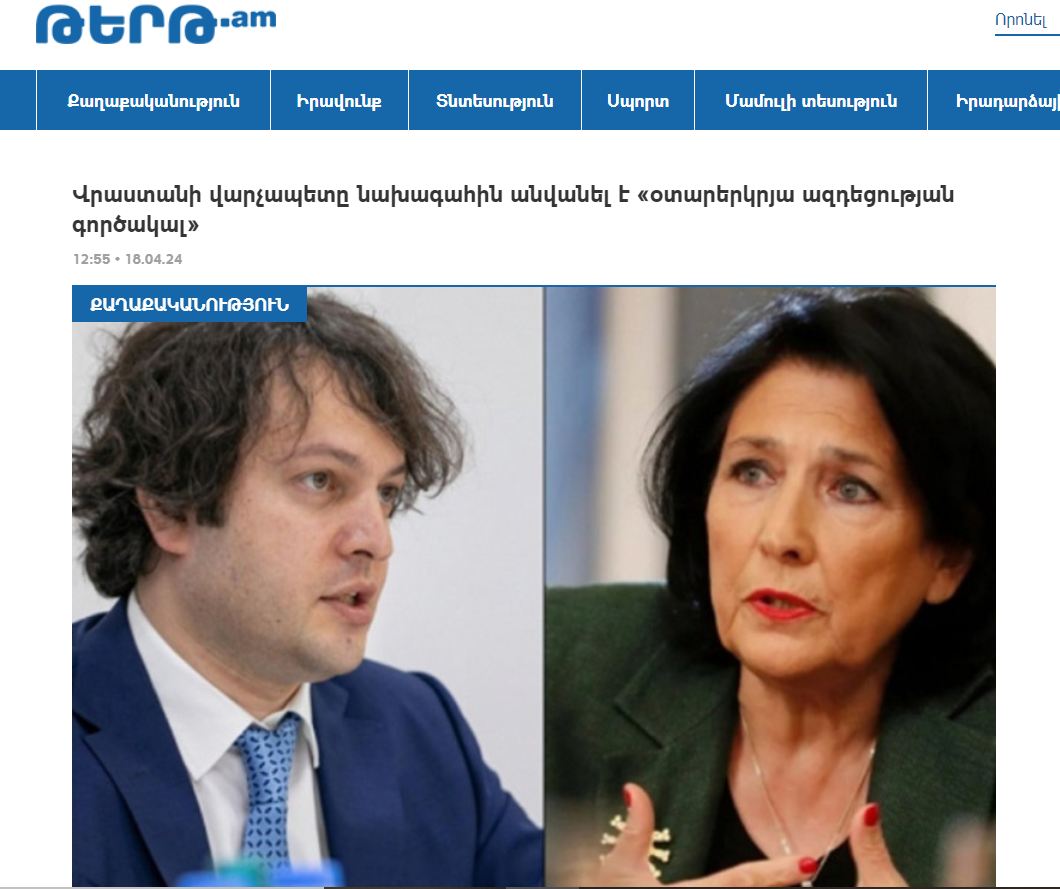
Provocative attitudes were felt in the information disseminated by another media outlet, Kentron TV, which addresses topics that are of essential importance for Armenia as well (for example, the issue of the opening of the second front). Their attitude was also felt from the headlines of the published materials: "Georgia's independence is not sold for any visa. The USA and the European Union want to punish Tbilisi"; "The center of Tbilisi turned into a battlefield, and the opposition were expelled from the parliament hall"; "An angry mob attacked the parliament building, tried to break the gate. Clashes in Georgia"; "You cannot force Turkey to open a second front, but can you force Georgia?"
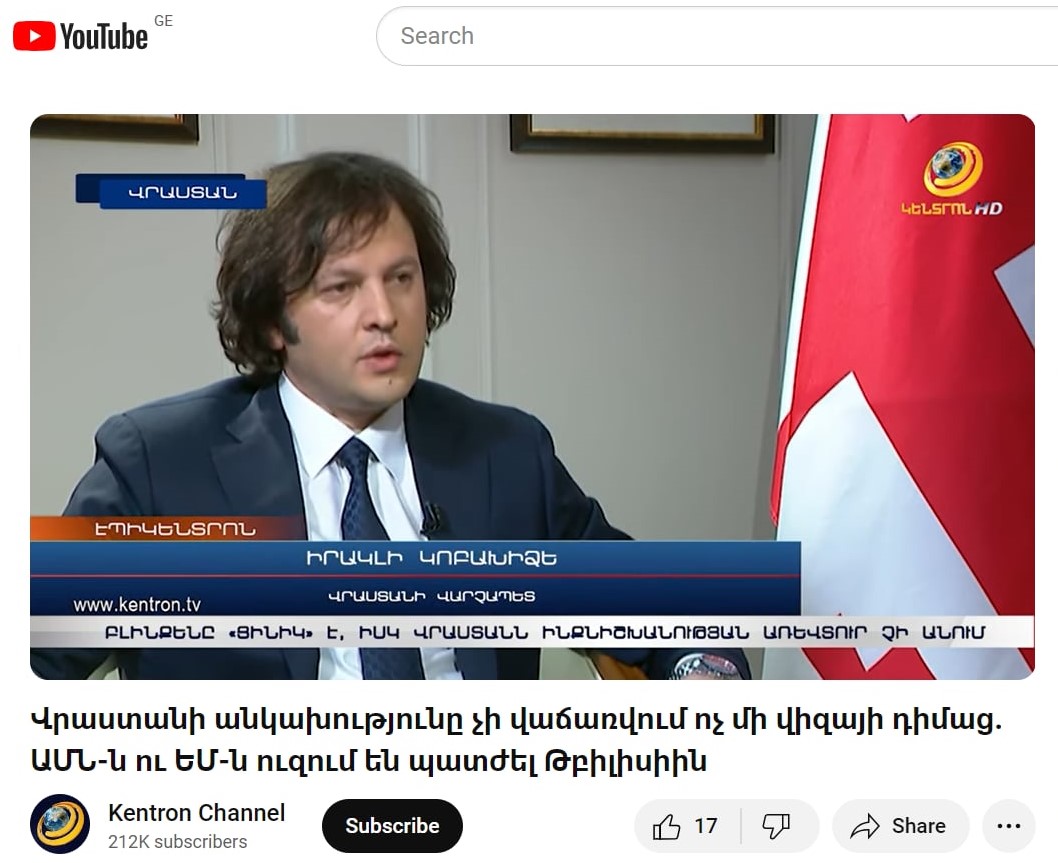
Some media outlets supporting the previous government of Armenia, such as, for example, News.am, Aravot.am, published neutral posts, although in their coverage the issue was considered only from the point of view of the ruling party of Georgia.
The opinions of specific politicians regarding these events were also interesting. Stefan Danieliani, a political scientist working in Armenia, who is distinguished by his anti-Western attitude, touched on the rallies held in Georgia and wrote on his Facebook: "Smart technology was used in Georgia. A significant part of the public was mobilized against the law “On Agents of Foreign Influence, but the new bill against LGBT propaganda made the protesters face another topic. They were being put in a position where they had to organize rallies against both of these bills, turning the rally participants into supporters of LGBT propaganda. And taking into account that Georgia is also the bearer of Eastern Orthodox civilization, this puts the participants of the rally in a difficult position."
A good number of pro-Western media outlets are found in Armenia (1in.am, Armtimes.com, Youtube - Factortv, Freenews), which also spread information about the developments in Georgia on their platforms. 1in TV is especially noteworthy, having dedicated several programs to the cycle of protests and emphasizing that the European future of Armenia is decided in the streets of Tbilisi. They consider the Russian-style Foreign Agents Law a violation of the constitution and a real coup d'état. At the same time, they note that Armenia can become an island with authoritarian states on all four sides. One of the programs was also dedicated to Russia's interests in Georgia, emphasizing that Moscow wanted to occupy Georgia by promising to return the occupied Abkhazia.
Several other pro-Western Armenian media outlets covered the actions against the Russian-style Foreign Agents Law, including Factor TV - "The Kremlin is pulling Georgia towards itself. Armenia's European future is threatened by the Law on Foreign Agents"; By Noyan Tapan - "The Kremlin on the offensive". The independent online media and television platform Civilnet from Tbilisi covered the protests and issues related to the law objectively, without distorting or interpreting the facts, and offered this coverage to listeners/readers.
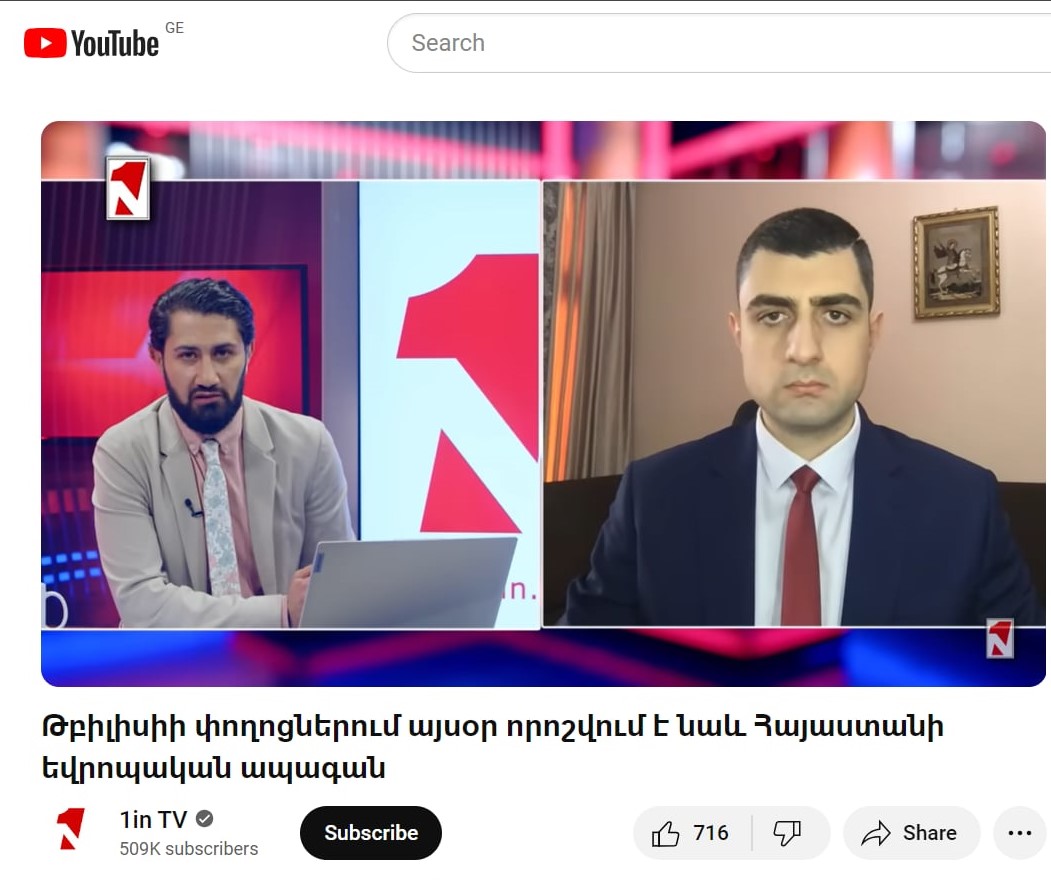
Concerning the protests and the Russian-style Foreign Agents Law taking place in Georgia in April-May, Armenian political parties decided to refrain from stating their positions and perspectives—both the pro-Russian opposition: Republican Party, Armenian Revolutionary Federation, and the Kocharian-Venetia Alliance of Armenia, and the opposition pro-European parties: Rally For The Republic, Republican Party, European Party of Armenia, and Christian People's Party. However, in several cases, specific leaders made individual statements. For example, the President of the European Party, Tigran Khzmalian, wrote about the ongoing protests in Georgia on May 15: "Imagine how much Putin is paying the Georgian government to speak against the European Union and the USA and to refuse the European integration that became law in Georgia..." It is interesting that in June, Tigran Khmzalian was not allowed entry into Georgia by the border police.
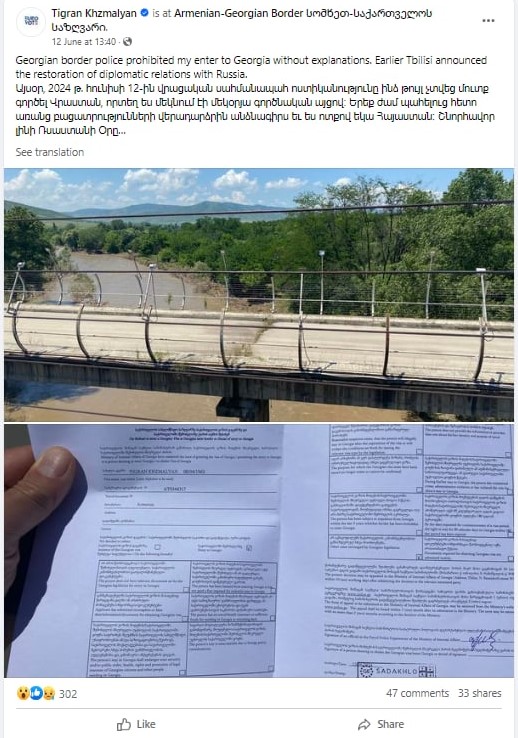
Armenian media's coverage of the events in April-May related to the Russian-style Foreign Agents Law was met with mixed reactions from the public, which was caused, in many cases, by the bias of the media and distortion of facts.
It should be noted that the comments of citizens on the posts shared by pro-Russian media outlets on social networks were radically different from the comments of the audience of pro-Western media outlets. For example, if we were to come across comments on the pro-Russian media: "They mixed up people’s heads here too, with Euro-stupidity, destroyed Ukraine, want to destroy us too", "Whoever listens to America, will find himself in the same situation", "The West will also destroy Georgia", etc. Different positions and opinions were observed on the posts on the pages of neutral media outlets: "Georgian people and rotten government are different phenomena. It is unlikely that Russian galoshes will be "sweet" for Georgians", "It was as if things were moving forward, now they have frozen [referring to European integration]", "Pro-Russian forces have achieved their goal, Georgian commanders do not know what to expect in the future, they are slowly preparing their children to be sent to the Russian army”.
In the end, the general trend observed among the population concerning the coverage of the April-May events in Georgia Armenian media on social networks is more or less positive: "Well done, Georgians, let the Armenian people also wake up", "Russia sold Armenian lands, now it has switched to the Georgians'', "This is Putin's next game, he wants the Soviet Union again", "How interesting, now we speak against Russia, while Georgia speaks against the European Union and NATO", "Georgian people must win, otherwise we will not be able to join the European Union", "Armenia is with you, we will enter the European Union together".
As discussed in the introduction, the topic of the political developments in Georgia has a significant impact on the countries of the South Caucasus. As such, information about the internal politics of Georgia is actively spread in Azerbaijan and Armenia. However, some biased approaches can be observed in the sharing of information on both sides, so that, on the one hand, they do not harm the relationship with the Georgian authorities, and on the other hand, they adapt the information to their own goals and objectives. All this is more noticeable in the case of Armenia, where the European integration campaign has actively begun, although pro-European politicians and media were less active in spreading information about Georgia.
As for the Azerbaijani media, it has a very rigid attitude towards the West, which is expressed through anti-Western and pro-government narratives, similar to Imedi TV and other pro-government media of Georgia. At the same time, in the case of Azerbaijan, the issue of the selection of "experts" is interesting, as most of them align themselves with pro-Russian and anti-Western messages.
Although the approach of the Armenian and Azerbaijani media concerning the April-May protests in Georgia is different, it should be noted that both sides choose the standard of coverage that corresponds to their national interests, historical ties, and regional dynamics in the South Caucasus.
-
-

This material has been financed by the Swedish International Development Cooperation Agency, Sida. Responsibility for the content rests entirely with the creator. Sida does not necessarily share the expressed views and interpretations.